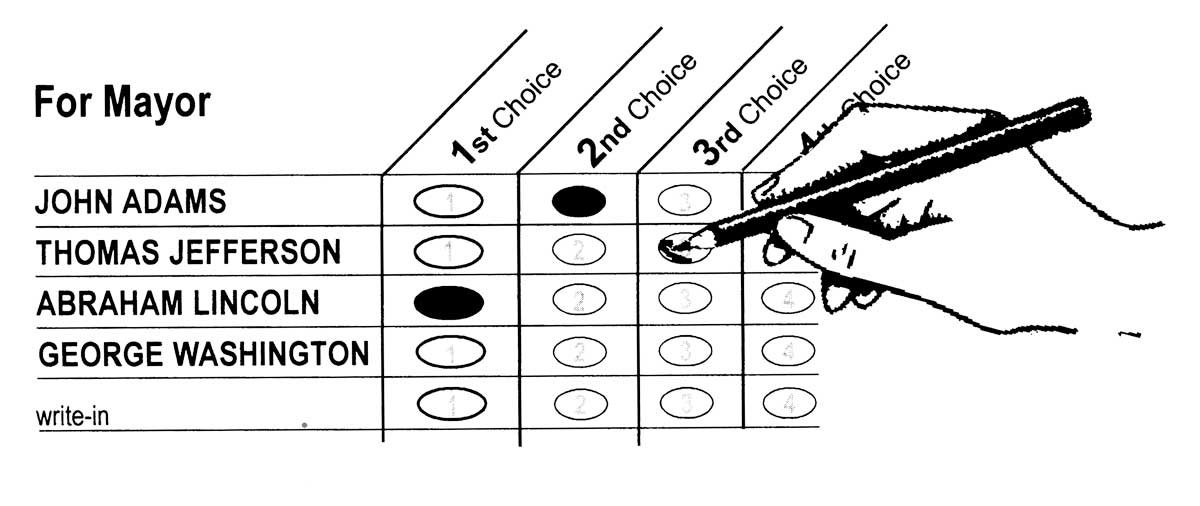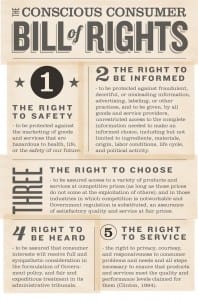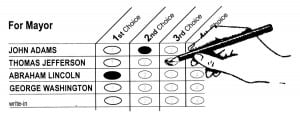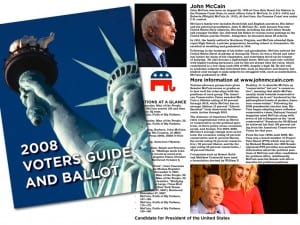Choice: American as apple pie, unless we’re talking politics
America talks about spreading “democracy” across the globe- but, I believe we need to reexamine what passes for “democracy” in this country. We talk about the right to choose who leads, who makes our laws and our “certain inalienable rights” that grant us the right to have choices- unless of course, it’s to have an abortion, marry someone of the same sex, or have more than two choices when going to the polls.
Yet, when it comes to our consumption economy- we’re overwhelmed with choices. The modern supermarket shelves offer us endless options- even under the same brand name. I get more choices in types of dryer sheets than I do in political thought in our country- and, the price tag on choosing between the two proffered brands has become obscene. We spend around $5 billion dollars (or more as this evolves) every two years to pick between two indistinguishable candidates? Trust me- with that kind of budget Procter & Gamble gives us hundreds of clearly distinguished brands- and all of them come with a modicum of a guarantee- something strangely missing from the American political model. Term limits have been a knee-jerk reaction to politics as a profession- but why should we be forced to part with a product we might love- if one ever managed to make it up from the primordial muck our system has “evolved” to? We’d have to throw our one beloved product out? What good is that?
Back in 1962 John F. Kennedy introduced a “Consumer Bill of Rights”- of course, our chosen brand of president got term limited by a gun, which totally screwed up the carefully planned process. It’s also sad that in a country with over 300 million people, the guy JFK beat came back to win later- only to resign in disgrace. To think that the best this system can do is give us only two choices (and that if we have to recycle the ones at the top until they win or go away) is just obscene.
JFK’s proposed CBoR has recently been resurrected by an ad man who seems to have gone rogue from the business of selling high fructose corn syrup and fast food to the obese and bad operating systems to the masses. Alex Bogusky is trying to redefine the consumption economy with a sustainable, sound and reasoned process. Sort of like a physicist searching for the “grand unification theory” or the early alchemists trying to turn garbage into gold, Bogusky’s new mission is a work in process, evolving- but he has begun with a new “Conscious CBoR”- and the third maxim is:
The right to choose–to be assured access to a variety of products and services at competitive prices (as long as those prices do not come at the exploitation of others); and in those industries in which competition is not workable and Government regulation is substituted, an assurance of satisfactory quality and service at fair prices.
via The New Conscious Consumer Bill of Rights – alexbogusky’s posterous.
Note, the place where competition is least working these days is in politics- and the regulators (voters) almost seem like inconsequential minions in a process now ruled by big money and big media.
Something needs to change. Sooner than later.
Here is my presentation from Pecha Kucha Dayton #7, on June 30, 2011, offering choices to change the way we choose our leaders. The room was dark, hot and crowded. The video is less than professional- and the presentation unrefined. For those of you not familiar with Pecha Kucha (or PK for those who don’t want to massacre the Japanese) check out the Pecha-Kucha site, the format is 20 slides, 20 seconds each- and that’s about it.
[vimeo]http://vimeo.com/25996348[/vimeo]
Instant runoff voting was invented by an American architect in 1871 and is in use worldwide. While it may sound complex, with computer vote tallying it becomes quite simple. With a list of candidates to rank, voters can give their vote to the person or party they feel most aligned with, knowing that if their candidate doesn’t get enough of the vote, their second or third choice still has a chance. The system gives opportunities for other parties to have a chance to form, grow and gain traction. Voters don’t have to feel as if they are voting against a candidate or making a choice between the lesser of two evils. The common complaint is that too many candidates can make voting difficult (the so called “Jungle Primary” is used in California- yet it’s proven that voters end up choosing respectable candidates over the superficial ones). This is a country that has no problems ranking and following over 40 NASCAR drivers and accepts the arcane BCS college bowl system to choose a national champion- our voters aren’t incapable of picking from a large field.
Public financing of elections is the key second part of this overhaul. We currently have a system that favors incumbency by a wide margin- mostly because access to campaign cash is easy for those in power, and because the ability to get easy free media coverage is denied opposition candidates. If you ever found it odd that you get a “newsletter from your congressmen” most frequently just before election season- and note that the mail is “franked” (free postage to members of congress) you are just scraping the surface of the uneven playing field we’ve created.
Our presidents serve for four years, but we can only expect work in the first two years of the first term, and the real president to emerge in the second half of the second term because the rest of the time, he’s busy raising money for his re-election or trying to influence congressional elections.
With public financing, politicians can no longer accept any donations, bribes or gifts. Campaigns are given equal media time, equal opportunities to present their case and we remove all opportunities for special interests to buy influence- giving the voters back the power to choose their leadership. Senator Dick Durbin has proposed a “Fair Elections Now” act that forces small dollar donations from voters to leverage into vouchers to run campaigns more like what we’re used to, however, it is possible to totally take money out of politics if we want.
Our current single day election system is easily influenced by bad weather. Elderly voters who have proven to be the one segment of our pathetically small voter base (only 79% of eligible voters are registered, and of those, many are infrequent voters) that reliably votes- can end up staying home in adverse weather. We have no provisions for weather calamities- such as major snow or wind storms, to provide for alternative voting days.
Voting by mail changes all this- giving voters the opportunity to spend time analyzing, researching and deciding without pressure of a single election day, or worrying about being confronted at the polls by opposition or last-minute attack ads. Sending every registered voter a publication with equal space for all candidates as well as a ballot to be mailed can help change the way campaigns have devolved to last-minute cage fights and unfounded “swift boating” attacks. Candidates can have complete control over their websites, where they can say anything they want- but in the voter guide- candidates must only present their positions, qualifications and put their promises in writing.
The last part of the proposed reform package is to limit actual campaigning, debates and media to the six weeks before elections. The idea that congressmen spend half of each two-year term campaigning is a colossal waste of resources- and our current political ad barrage in the critical fourth quarter of the year makes it hard for commercial interests to buy media and advertise in the critical holiday buying season. Many have proposed that “election day” be moved to the Fourth of July- to give some additional significance to the celebration of the day that we declared our intent to overthrow the government and to celebrate our democracy.
In a country where our “rights” are broadly discussed, the right to choose our leadership has sadly not made it to the top of any list of debate. If we truly want “Change we can believe in” as our last successful presidential candidate promised, we need a system for choosing candidates that we can believe in.
Right now, we have one that gives us the best politicians money can buy, and they come with no guarantee of performance. By transforming our electoral system from an auction to a fair market, we may start to get a democracy that works.





I really like the idea of run off voting. Especially since everyone I vote for does not win. I always vote for the most libertarian candidate and in some sense I know the vote is wasted. So, I am a huge fan of this process.
Also a huge fan of wider voting windows, although I would not change the voting timeline to coincide with a holiday famous for travel. But, August would be nice.
The publicly funded part would not work out. Lets say I wanted Joe Bob to win. So, I have a bunch of Joe Bob signs and commercials made all by myself. Joe Bob does not even have to know about them. You cannot really stop this type of donation “behavior” and therefore I do not really see this as any sort of solution what so ever, but rather another cultural mistake which suggests we need something to be government or public to work.
Now, if we simply limited the scope of government and disallowed the great majority of things they do…………… competition would not be so financially fierce and donors would not be so financially motivated to donate to a particular candidate. For example, the large breweries in the US will donate to candidates that want to keep the enforcement of antiquated distribution law in place. Whereas a Libertarian would say…………if you can brew beer, you can sell beer. Hence, Budweiser always has a huge financial incentive to maintain their mercantile relationship with government by donating to a particular candidate.
“For example, the large breweries in the US will donate to candidates that want to keep the enforcement of antiquated distribution law in place. Whereas a Libertarian would say…………if you can brew beer, you can sell beer. Hence, Budweiser always has a huge financial incentive to maintain their mercantile relationship with government by donating to a particular candidate. ” – Robert Vigh
A topic near and dear to my heart. Frankly its a crime that I cannot sell the beer I brew in my garage, which is damn good, to my local pub.
Small brewers are just as guilty of trying to use the government to give them an advantage http://www.supportyourlocalbrewery.org/know_issues.html
There are two steps that need to be taken if we are ever to wrestle control of our country away from the political class.
1. institute the Fair Tax – it would remove the ability of the political class to buy campaign donations by promising preferrential treatment under the Internal Revenue Code, and begin to remove the government from our life.
2. end the gerrymandering of districts – the two parties get together and carve up the districts (both state and federal) so that districts are either safe seat for a democrat or a republican. At the end of the day, the elected officials can do what they damn well want because they know that the party establishment will shield them from a primary challenge and in the general election they are a lock because of the demographics of the district. You only have to look at how many republicans were returned to the state house when Taft was governor. The population was made as hell over the way state government was working when the election rolled around, but 90+% of the S.O.B.s were returned to office in large part because there weren’t any real choices for most voters.
David, …and yes, this is very belated….you gave a great presenation at pecha kucha. Excellent job!
In the 8 years I lived in Oregon I voted in every single election, whether they were levies or presidential elections. Despite being very political and active I did not do so when I lived in Ohio previously…
Reasons why I voted in Oregon every single time:
1. mail in ballots. so so easy, so so efficient, why every state hasn’t implemented the practice is a mystery to me. I loved it! Mail it in or drop it off at one of many ballot drop sites. Two envelopes and an overlapping signature to seal it up safely.
2. You receive an unbiased voter guide book with equal space give to all candidates and issues. Not to mention all the local papers and weekly had voter’s guides as well. Even if I previously had no information on an issue that after reading through the official voter guide and the ones in the news papers that I was informed enough to cast a vote.
Result: Oregon consistently had near 70% voter turnout in gubernatorial election years and over 80% in presidential election years… the third highest in the country.
I remember one of the first times I tried to vote and was denied access to the polling place. It was in Fullerton, CA in the late 1980’s. The polling place was in the commons room of a gated condo complex just down the street from my apartment. They would not buzz me in the gate.
Hard to believe that a white, American born, blond-haired blue-eyed guy would not be allowed to vote in Orange County – the best bastion of white Republicanism in the U.S., right next to where they would build the Ronald Reagan Library, right near the comfortable home of the White Aryan Resistance… and here I was a legally registered voter, with a legal driver’s license, a straight job, a place to live, and everything else one would think a citizen would need to vote.
After a variety of (mostly failed) attempts to vote and be a productive citizen over the past number of years – I attempted once again to register to vote here in Montgomery County… but it seems I checked a wrong box or something. I received a letter yesterday stating that my registration is invalid.
I will attempt to rectify it, David. But my personal hopes to enter the political field myself are set aside.
My fear is that the corrupt system will only serve to tarnish the uncorrupt as you try to make your way to do good. Keep your head up… and watch your back.